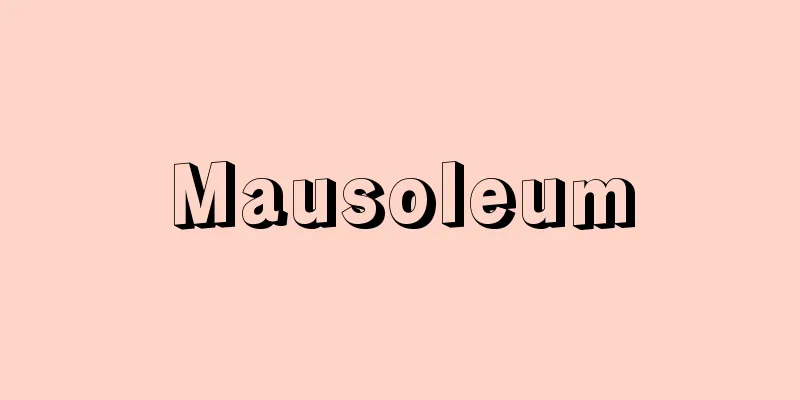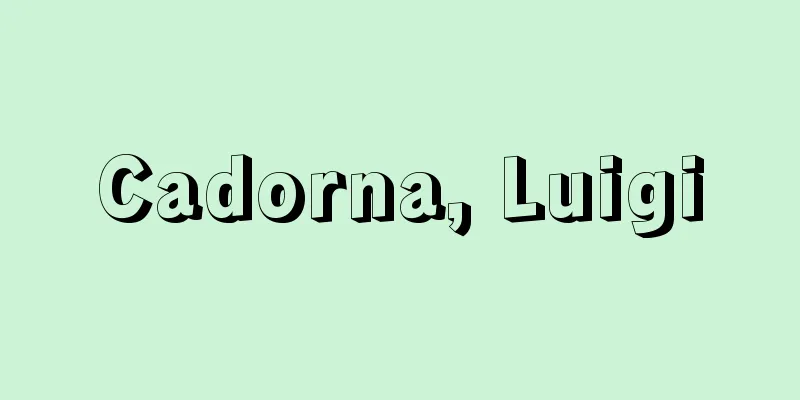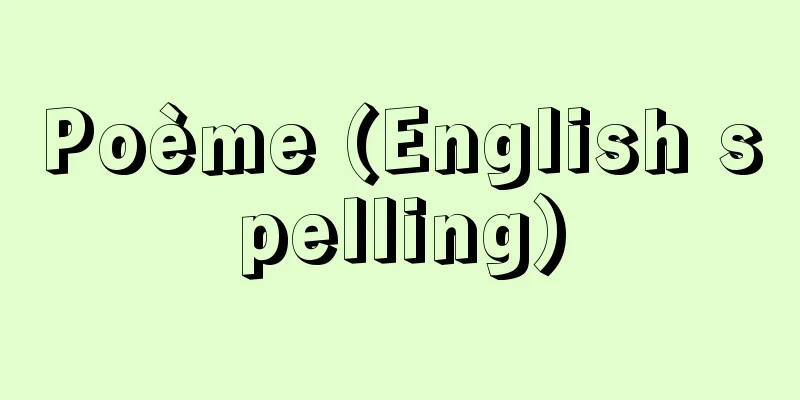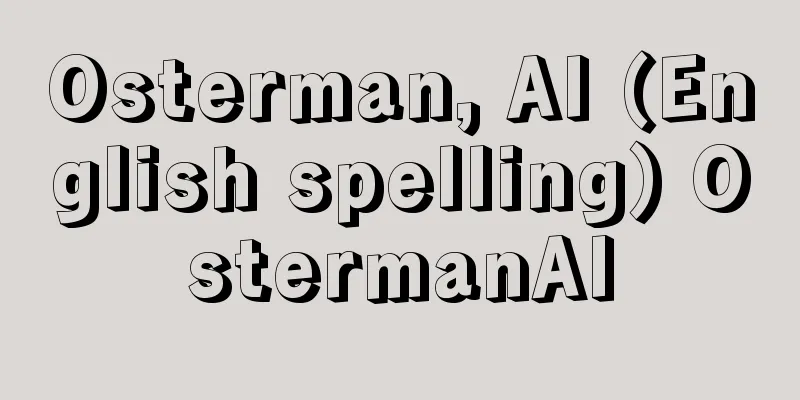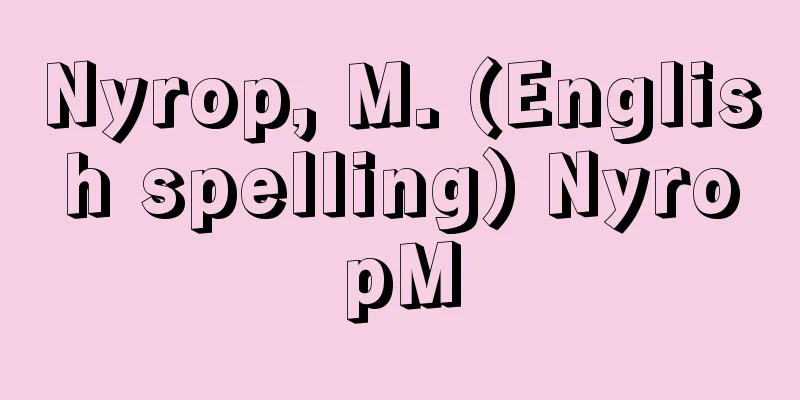Pedagogy - pedagogics (English spelling)
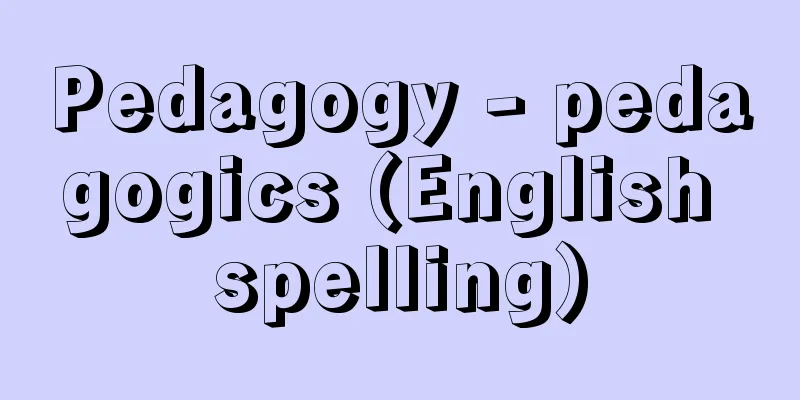
|
The term refers to the study of education in general, that is, research and theories about education in the broadest sense, including both scientific and non-scientific theories. [Michio Ogasawara] EtymologyThe English word pedagogics, the German word pedagogic, and the French word pedagogy, all of which mean education, are derived from the Greek word paidagōgikê, meaning "the art of guiding children." In other words, it is a compound word of "child" (pais) and "I guide, instruct, discipline" (ago), and is used as a noun adjective meaning "where children are guided." According to one theory, it should be considered as a noun usage formed by the omission of techne from the Greek word paidagōgikê technê, and therefore paidagogê is formed from the three elements pais (child), again (guidance), and techne (technology), and means the technique and science of guiding children. Therefore, "pedagogy" derived from this etymology is broadly considered to be the technique of education and the science of studying education, and is the name of educational theory in a broad sense. [Michio Ogasawara] EstablishedEtymologically, pedagogy began as a practical technique for educating "how to educate children" that can be found in all eras and at all stages of society (pedagogy as a technical theory). [Michio Ogasawara] Education as a theory of technologyThis type of pedagogy has been the basis of education since the Greek period as a theory or theory of education as practical wisdom for everyday education. For example, during the Renaissance, many educational theories for the children of royalty, nobles, and wealthy merchants were written by their private tutors, and pedagogy as a "technique for guiding children" originated from their methodology for teaching Latin (an essential cultural education for the upper classes at the time). An example of a work that compiled these educational theories, centered on the teaching of Latin by private tutors, into a comprehensive system of pedagogy is the 17th century work Didactica Magna (Latin, 1657) by Comenius of Bohemia (now the Czech Republic). [Michio Ogasawara] The Establishment of Modern EducationFurthermore, in the face of the upheaval of 18th-century society, especially towards the latter half of the Enlightenment, Rousseau of France and Pestalozzi of Switzerland tackled the issue of cultivating true humanity, particularly the problem of how to achieve it, and developed their theories of education (teaching theory) and educational thought. Pestalozzi in particular developed a theory of education centered on the theory of basic cultivation, which aims for the harmonious development of humanity, and also presented the basis for the establishment of modern pedagogy, such as by touching on the relationship between society and education. However, in the 19th century, as new relationships between technology and science developed, the possibility of education as a theory (education as a scientific theory) was explored in contrast to education as a theory of technology, and the relationship between the two pedagogies became a major issue. In general, the phenomenon of "education" is divided into education as a direct fact and education as understood in academic recognition and reflection, with a complex relationship between them. Roughly speaking, education in the English-speaking world has taken the former position, and has been particularly interested in the school system, with little interest in the philosophical (theoretical) development of education. In contrast, in Germany, the latter position has been taken, with a strong interest in the philosophy of education, with little interest in the facts of practical experience, and the education taught as an academic subject at universities has been narrowed down to a theory for teacher training at best. In this situation, it was Herbart who first systematized and established education as a science. [Michio Ogasawara] Pedagogy as a scienceHerbart was the successor to the Kant Chair at the University of Königsberg (now the Immanuel Kant-Baltic Federal University), and was naturally greatly influenced by Kant's philosophy, but his interest in pedagogy began with his experience as a private tutor in his youth. This was eventually systematized as his General Pedagogy ( Allgemeine Pädagogik ) (1806). In it, he argued that education should not be based simply on experience or custom, but must have a scientific basis. Thus, Herbart looked at the uniqueness of education and attempted to construct pedagogy as an autonomous science with its own subject area and unique research method. In his later work, Outline of Lectures on Pedagogy ( Umriß Pädagogischer Vorlesungen ) (1835), he stated that "pedagogy as a science depends on practical philosophy and psychology, the former showing the goal of education, the latter showing the way, the means and the obstacles," and attempted to systematize it by incorporating practical philosophy (ethics) and psychology as the basic sciences of pedagogy. Herbart's systematized pedagogy would later lead to a separation and split into speculative ethics and empirical psychology. However, this pedagogy was proclaimed as the so-called Herbartian school not only in Germany but also in the educational world around the world (including Japan, of course). It is no exaggeration to say that subsequent pedagogies developed by inheriting or criticizing Herbart's pedagogy. [Michio Ogasawara] ExpandTwentieth-century pedagogy has been divided into two lines of study: (1) that which seeks to construct an empirically-founded theory of education, and (2) that which seeks to construct a philosophy-oriented theory of education. This shows that "scientific" is understood in two different senses. In (1), taking the position of empirical science is considered to be scientific, while in (2), being based on principle-based scientific reflection, i.e., philosophical reflection, is considered to be scientific. [Michio Ogasawara] Experience-based pedagogyThe following two can be cited as genealogies of (1). (a) Influenced by the experimental psychology of W. Bund, Wilhelm August Lay (1862-1926) and Ernst Meumann (1862-1915) founded the position of "experimental pedagogy" (experimentelle Pädagogik) (German), which used observation, experiments, and statistics as its means, in opposition to the traditional speculative and idealistic pedagogy. Furthermore, Peter Petersen (1884-1952) attempted to overcome the weaknesses of this experimental pedagogy with his "pedagogical fact study". After that, German positivist research was developed into the concept of "deskriptive Pädagogik" (descriptive pedagogy) by Aloys Fischer (1880-1937), who relied particularly on the phenomenological method, and Rudolf Lochner (1895-1978) further systematized it, and the science of education as empirical pedagogy was constructed. However, these educational sciences subsequently developed more in America than in Germany, and were organized by Thorndike, J. Dewey and others as the principles of education and the science of education, and became influential. (b) On the other hand, the French positivist sociologist Durkheim regarded education as a social fact and attempted to study it objectively and empirically. He advocated the "science of education" (science de l'éducation) (French) in opposition to conventional pedagogy, pointing a new direction to the scientific study of education. In Germany, Krieg, like Durkheim, understood education as a fundamental function of society, and, in contrast to conventional pedagogy that started from values and oughts that define the purpose of education, attempted to thoroughly explore the essence of education based on the facts of education, and advocated the "pure science of education" (reine Erziehungswissenschaft) (German). [Michio Ogasawara] Philosophically Oriented Pedagogy(2) There are two developments in the genealogy: (a) Generally referred to as the "Neo-Kantian School," in particular in the field of pedagogy, the Marburg School's Natorp and Richard Hönigswald (1875-1947) are among those who strived to establish a new normative pedagogy. (b) The position of "spiritual scientific pedagogy" (geisteswissenschaftliche Pädagogik) (German: "spiritual scientific pedagogy"), which criticized both empirical science pedagogy, the position of natural science methods such as educational science, and normative pedagogy that claimed universal validity, formed the mainstream of German pedagogy in the 1920s. These include Nohl, Spranger, Ritt, Wilhelm Flitner (1889-1989), and their disciples Borneau and Martinus J. Langeveld (1905-1989) of the Netherlands. Although each scholar places different emphasis on different aspects of this pedagogy, they are characterized by seeking the foundation of education in "culture," an objective expression of the human spirit, and developing educational theory in relation to historical culture and the individuals who accept it. As for the scientific method, they conduct their research using a hermeneutical method based on Dilthey. Specifically, they use existing literature related to education and pedagogy as materials, "interpret" it, extract its pedagogical substance, consider it historically, and assign new pedagogical meaning to it and formulate it. [Michio Ogasawara] Japanese EducationKaigo Kiomi's comment that "Japan's pedagogy (theory) over the 60 years spanning the Meiji, Taisho, and Showa periods has developed while maintaining a close relationship with modern Western pedagogy (theory)" succinctly describes the nature of Japanese pedagogy. In 1882 (Meiji 15), Izawa Shuji, who later became the principal of Tokyo Higher Normal School, wrote "Pedagogy" (Educational Studies), the first book published in Japan under the title "Pedagogy." This book was written after Izawa returned to the United States in 1875, when he went to study normal school subjects. It was based on lecture notes he took while attending lectures by Albert Gardner Boyden (1827-1915), the principal of Bridgewater Normal School in Massachusetts, and was written for the general reader. The content is mostly psychology, with some educational theory added. It is assumed that the author intended to use psychology to establish an academic system of education, and to make this the first pedagogy in Japan. Meanwhile, the first person to give lectures on "pedagogy" at Tokyo Imperial University was a German gymnasium teacher, Hausknecht, who was invited by the Meiji government in 1887. His pedagogy was of the Herbartian school. In this way, Japanese pedagogy began as a transplant of Western pedagogy, and developed in close relation to trends in German pedagogy in particular, exerting a profound influence on the nature of Japanese pedagogy in later years. Of course, from the end of the Meiji period to the Taisho period, works were published that criticized traditional pedagogy by looking squarely at the reality of Japanese education and attempting to construct a pedagogy that could respond to practical issues, and from the end of the Taisho period to the beginning of the Showa period, (1) works were published that aimed to systematically construct a pedagogy that could be called pedagogy academism. (2) On the other hand, in the 1930s, in opposition to this academism, the exploration of "educational science" was carried out, particularly as a private education movement. The aim of these works was to scientifically investigate the reality of education and educational practice. [Michio Ogasawara] Post-World War II developmentsAfter the war, the psychological and sociological research of education was greatly influenced by American educational science, especially Dewey's experimentalist educational (philosophy) and empirical research on education. From the 1950s, as a criticism of the prewar ideological pedagogy, an educational science that places pedagogy in a social process and considers its social function was advocated in response to the educational crisis in Japan. The so-called "educational science debate" of the late 1950s represented a new development that analyzed educational problems from a social scientific perspective and sought to find a way to overcome the educational crisis. At the same time, with the introduction of Soviet pedagogy, education and educational theory in socialist society were incorporated into the field of educational research, and it became popular until the collapse of the Soviet Union in 1991, influencing the development of various educational theories. [Michio Ogasawara] Areas and issues of educationPedagogy, which began as a technique for guiding children, has today come to encompass not only the education of children but also andragogy (a compound word from the Greek words andros, meaning adult, and agogos, meaning instruction), and the scope and subjects of research have expanded and developed. On the one hand, pedagogy has shown a tendency to deepen into various fields, such as (1) philosophy of education, which seeks to approach the essence and ultimate goal of education, (2) history of education, which seeks to clarify the historical development of educational thought and educational facts, (3) sociology of education, which seeks to clarify the relationship between education and society, (4) educational systems studies and educational administration, which seek to analyze educational systems and organizations such as schools, (5) comparative education, which conducts comparative research on education in various countries, and (6) educational psychology, educational methodology, educational technology, and educational management, which are practical and technical in nature and are interested in classes, teaching methods, and management methods. Furthermore, it has since formed a university field that includes early childhood education, education for the disabled, therapeutic education, and university education. However, it is also true that such diversified research fields have become isolated from each other, and have produced a remarkable fragmentation of pedagogy research, because research is carried out based on the methodology of each individual research field (for example, sociological methodology in the case of sociology of education). This phenomenon of fragmentation of the educational sciences is, on the one hand, inevitable in the process of scientific development, but at the same time, there has been awareness that the science of education must integrate the results of various specialized research studies based on the perspective of human development, and must be an independent science with its own research subject and methodological foundation.In the 1960s, the exploration of the theory of education as a comprehensive study of human development began as research on "educational anthropology." [Michio Ogasawara] current situationThe social changes on a global scale since the 1960s created the need for educational reform, and inevitably forced a rethinking of the nature of pedagogy (research), and prompted its transformation. However, until the mid-1970s, research continued based on the understanding of science through previous academic conventions (for example, hermeneutical pedagogy, empirical pedagogy, critical pedagogy, etc. in the case of the former West Germany), or on pedagogy that complemented these. However, such traditional pedagogical frameworks reached their limits when it came to concrete reforms of the education system, and this resulted in the ineffectiveness of pedagogy itself. [Michio Ogasawara] Focus on "everyday life"In general, new positions and methods were sought, since rather than interpreting things objectively according to what they should be, it would be better to ask questions in the light of concrete, everyday, real situations. This resulted in the concept of action research, or the concept of an "everyday orientation." It called for attention to the everyday aspects of human development, or to problem-solving in the everyday educational reality, or generally to practical problems. This tendency coincides with the intellectual climate that emerged in the 1970s and 1980s, which placed a higher priority on experiences based on sensibility and personal needs than on objective theory. However, if this tendency is pushed forward as a theory of education, it becomes just one of many schools of thought. In fact, with regard to "everydayness," there has also been a position that advocates a paradigm (framework of thought) shift in education (research) that integrates traditional empirical/analytical education with normative/practical education. [Michio Ogasawara] Theory subdivisionEducational studies (research) up until the mid-1980s was characterized by heterogeneity or a plurality of concepts. In response to the segmentation of educational subjects (areas) in the 1960s, educational theory (educational research) brought about a rapid segmentation of theories, making it difficult to return to a unique educational tradition. Many concepts related to education since the 1980s have taken on a borrowed appearance from other academic fields related to the human sciences. For example, materialistic pedagogy in German-speaking countries (which declined in the 1990s), psychoanalytic pedagogy, phenomenological pedagogy, and praxeological pedagogy, etc. These use the ideas, theories, or methods of materialism (Marxism), psychoanalysis, phenomenology, or praxeology as methodologies for educational research. [Michio Ogasawara] New Theoretical Foundations of EducationOn the other hand, there have been attempts to place pedagogy on new theoretical foundations, namely interactionism, structuralism, systems theory, etc., including concepts nourished by theories coming from the British, American or French traditions. Below, an overview of these positions is given. [Michio Ogasawara] Interactionist PedagogyInteractionist pedagogy is very close to communicative pedagogy. In other words, the concept of interaction is considered to be an extension of the concept of communication. The characteristic of this concept is that it assumes the existence of "ego identity (knowledge of who one is)". In that respect, interactionism is closely related to psychoanalysis. On the other hand, interactionism has a program based on action theory. Ultimately, it assumes that "all social phenomena are attributable to human intentional activity". As long as humans act based on the understanding of meaning, the task of interactionist pedagogy is to understand such meaning. This theory is self-relational in the sense that it takes everyday problems as its subject and uses everyday language to advance the theory, and it is normative in the sense that it takes "ego identity" as its basic goal category. The task of the educational curriculum is to enable the development of "ego identity" and promote the maintenance of a balance of identity in the life of an individual. This concept is said to be an American adaptation of the pre-1933 psychoanalytic tradition based on G. H. Mead. [Michio Ogasawara] Systems-based pedagogySystems pedagogy originated from the debate between critical social theory and systems theory beyond education in the early 1970s, namely the debate between Habermas and Luhmann (1971), and attracted the interest of educationists and was theorized. According to this position, a "system" is defined as a set of objects that includes the relationship between the object and its attributes, and pedagogy is also understood as a system. Therefore, certain attributes of pedagogy are interpreted as being generated by the dynamism of the system itself, rather than belonging to the subject by intention. For example, the efforts of educators to gain autonomy are understood as "problems brought about by social fragmentation." This attitude makes it clear that systems pedagogy is in a sense on the same level as pedagogy, while at the same time analyzing the systemic characteristics of pedagogy. Naturally, this position is criticized from the perspective of critical social theory, for relativizing and even denying the intentions, meanings of actions, and freedom of the actor. [Michio Ogasawara] Structuralist pedagogyStructuralist pedagogy can be considered a theoretical application of structuralism, which has been attracting attention in research in cultural anthropology and linguistics. The point of structuralism is to reconstruct the deep structures that are thought to form the basis of the phenomena that appear before our eyes, or the superficial structures. The point is to reduce the diversity on the surface to basic structures at a deep level, but in this pedagogy, the complex phenomena of educational behavior are reduced to deep structures using structuralist methods. The advantage of this concept is that it works without assuming an agent. In other words, it is the deeper structures that are considered to be effective, not the intentions of the "actor (educator or student)." [Michio Ogasawara] Pedagogy in the Postmodern ContextThese pedagogical debates were developed in the mid-1980s under the name of Dieter Lenzen's (1947- ) "crisis of the subject" as the so-called debate on postmodernism. In other words, people have come to understand that there is no longer a grand theory, or what J.F. Lyotard calls a "grand narrative," capable of fully justifying all possible actions in all areas of culture. People have realized that the main cause of the disasters that occurred in the 20th century was the "narrative" of the dialectic of the "Enlightenment" (the progress of human history through human reason) that began in the 18th century. This includes a fundamental criticism of the way theories are produced today. The conclusion is that either the lack of theoretical principles or the resulting lack of direction is accepted, or that there is a theoretical diversity that allows one group of people to go in one direction and another group of people to go in another direction. This has consequences that are incompatible with pedagogy in its ultimate form. As we have seen, pedagogy is itself a child of the Enlightenment. It not only owes its existence to the "grand narrative", but is almost this narrative. If pedagogy consists in the demand for "education to a higher humanity" that produces progress, can we imagine a philosophy that distinguishes (recognizes) those who do not participate in this purpose, this action? Essentially, pedagogy must see the direction in which everything moves. But today, pedagogy cannot justify such a binding orientation. Of course, one could immediately draw the conclusion from this that pedagogy should be abandoned. But this conclusion, as Lenzen points out, is unrealistic. By "unrealistic", I mean that the educational practice that is the subject of study still exists as a social function, and pedagogy is not abandoned as its practical application. If education were to be discarded, it would become impossible to distinguish the totality and intolerance of education from racism, religious fundamentalism, or the totalitarianism that is the origin of Marxism and Nazism. Therefore, it must be assumed that education, as a guiding force for democracy, and the educational system, together with educational theory, will continue to exist for the sake of democracy. In this context, what is needed in the postmodern environment is (1) a pedagogy that acts as a guide for those involved in the educational curriculum, implying the direction of their actions and even the failure to provide education, to the extent that educational intervention can be justified (to the extent that educational sacrifices can be reduced), and (2) a pedagogy that reflectively engages with the outcomes of education. [Michio Ogasawara] Inagaki Tadahiko (ed.), Modern Japanese Educational Studies 8: Genealogy of Educational Theories (1972, Kokudosha) ▽ Kaigo Muneomi et al. (eds.), Expanded Edition, Complete Works of Education 1: Theory of Education (1975, Shogakukan) ▽ Ogasawara Michio, Theory-Practice Problems in Education (1985, Gakubunsha) ▽ H. E. Tenold, Ogasawara Michio and Sakakoshi Masaki Supervised Translation, The "Modern" Problem in Education (1998, Tamagawa University Press) ▽ Ogasawara Michio (ed.), Studies in Spiritual Scientific Education (1999, Tamagawa University Press) ▽ The Society for the History of Educational Thought, Dictionary of Educational Thought (2000, Keiso Shobo) ▽ Dieter Lenzen Erziehungswissenshaft Ein Grundkurs (1995, Rowohlt Verlag, Reinbek) ▽ “Frieda Heyting, Jan Koppen, Dieter Lenzen and Felicitas ThielEducatinal Studies in Europe (1997, Berghahn Books, Providence Oxford)” [References] | | | | | | | | | | | | | | | | | | | | | | | | | | | | | | | | | | | | |Source: Shogakukan Encyclopedia Nipponica About Encyclopedia Nipponica Information | Legend |
|
広く教育についての学、すなわち、科学的理論も非科学的理論をも含めた、もっとも広い意味での、教育に関する研究や理論の名称。 [小笠原道雄] 語源教育学を意味する英語のペダゴジクス、ドイツ語のペダゴーギク、フランス語のペダゴジーは、いずれもギリシア語のパイダゴーギケーpaidagōgikêに由来し、「子供を導く術」を意味していた。つまり「子供」(パイースpais)と、「私は導く、指導する、しつける」(アゴーago)の複合語で「子供を導くところの」という形容詞の名詞的用法であるという。一説によれば、ギリシア語のパイダゴーギケー・テクネーpaidagōgikê technêからテクネーの省略によって成立した名詞的用法と考えるべきで、それゆえ、パイダゴーギケーはパイース(子供)とアゲイン(導く)とテクネー(技術)との3語を要素として成立しており、子供を導く技術と学問を意味する。したがって、このような語源に由来する「教育学」は広く教育についての技術、教育について研究する学問と考えられ、広い意味での教育理論の名称となっている。 [小笠原道雄] 成立語源から教育学は、あらゆる時代のまた社会のあらゆる段階にみられる「子供をどう教育するか」という実際的な教育することの技術として出発した(技術論としての教育学)。 [小笠原道雄] 技術論としての教育学こうした教育学は、日常的な教育の実践的知恵としての教育論や教育説として、ヨーロッパではギリシア以来、基調となっているものである。たとえば、ルネサンス時代には、王侯、貴族や豪商の子供たちのための教育論が、その家庭教師であった人々の手によって数多く書かれているが、とくに、彼らによるラテン語(当時、上層階級の人々にとって必須(ひっす)の教養であった)教授方法論から「子供を導く技術」としての教育学は出発しているのである。 このような家庭教師によるラテン語教授中心の教育論を集大成し、包括的な教授学の体系にまでまとめあげたものとして、17世紀、ボヘミア(いまのチェコ)のコメニウスによる『大教授学』Didactica Magna(ラテン語、1657)があげられる。 [小笠原道雄] 近代教育学の成立さらに、18世紀社会の激動に直面して、とくに、啓蒙(けいもう)期の後半にかけて、フランスのルソーやスイスのペスタロッチは、真の人間性を育成する問題、とくに、その方法上の問題と取り組み、教育論(教授論)、教育思想を展開した。なかでもペスタロッチは人間性の調和的発展を目ざす基礎陶冶(とうや)論を中心とした教育論を展開し、また社会と教育の関係に言及するなど、近代教育学成立の基礎を提示した。 ところが19世紀に入り、技術と科学の新しい関係が発展してくるにつれて、技術論としての教育学に対して、理論の学としての教育学(科学理論としての教育学)のあり方の可能性も探究され、ここに二つの教育学のあり方の関係が大きな問題となった。全体的に述べれば、「教育」という事象に対して、直接的事実としての教育と、学的認識・反省においてとらえられた教育とが相互に複雑な関係をもって分節する。大まかにいえば、英語圏における教育学は、前者の立場にたって、とりわけ学校制度に関心をもち、教育学の哲学的(理論的)な発展にはあまり関心がもたれなかった。これに対して、ドイツにおいては後者の立場から、教育学の哲学的関心が強くもたれ、実践的な経験の事実についてはあまり関心が払われず、大学において学問として教授される教育学もせいぜい教師養成のための理論へと狭められていた。このような状況のなかで、科学としての教育学を最初に体系化し、成立させたのがヘルバルトである。 [小笠原道雄] 科学としての教育学ヘルバルトはケーニヒスベルク大学(現、イマヌエル・カント・バルト連邦大学)におけるカント講座の継承者で、当然カント哲学の影響が大であるが、教育学へ関心を寄せたのは、若いころの家庭教師の経験からであった。これがやがて彼の『一般教育学』Allgemeine Pädagogik(1806)として体系化されるのである。そこには、教育は単に経験や慣習によって行われるべきではなく、科学的基礎をもたねばならないことが主張されている。かくてヘルバルトは教育の独自性を見つめ、教育学を固有の対象領域、固有の研究方法をもった自律学として構築しようと企てた。後期の著作『教育学講義綱要』Umriß Pädagogischer Vorlesungen(1835)において、「科学としての教育学は実践哲学と心理学に依存し、前者は陶冶の目標を示し、後者は道、手段ならびに障害を示す」と述べ、教育学の基礎科学として実践哲学(倫理学)と心理学を取り入れることによってその体系化を試みたのである。 ヘルバルトによる体系化された教育学は、その後、思弁的な倫理学と実証的な心理学への分離・分裂を導くことになる。しかしながら、この教育学はいわゆるヘルバルト派としてドイツ国内はもとより、広く世界(当然日本も)の教育界に宣布された。その後の教育学は、ヘルバルト教育学の継承ないし批判によって発展していくといっても過言ではない。 [小笠原道雄] 展開20世紀の教育学は二つの系列に分類され展開する。すなわち、(1)経験によって基礎づけられた教育の理論を構成しようとするものと、(2)哲学に方向づけられた教育の理論を構成しようとするもの、である。このことは「科学的」ということが二つの意味において理解されていることを示すものである。(1)では実証科学の立場をとることが科学的であるとされるのに対して、(2)では原理科学的な反省、すなわち哲学的反省に基づくことが科学的であるとみなされるのである。 [小笠原道雄] 経験によって基礎づけられた教育学(1)の系譜として次の二つがあげられる。 (a)W・ブントの実験心理学に影響を受け、従来の思弁的・観念的教育学に反対して、観察、実験、統計を手段とする「実験教育学」experimentelle Pädagogik(ドイツ語)の立場がライWilhelm August Lay(1862―1926)、モイマンErnst Meumann(1862―1915)によって創始された。さらにこの実験教育学の弱点を克服しようとしたのがペーターゼンPeter Petersen(1884―1952)の「教育的事実研究」である。その後、ドイツの実証主義的研究はとくに現象学的方法に依拠したフィッシャーAloys Fischer(1880―1937)によって「記述的教育学」deskriptive Pädagogik(ドイツ語)の構想に展開し、ロホナーRudolf Lochner(1895―1978)によって体系化が進められ、経験的教育学としての教育科学が構築された。しかしながらこれらの教育(科)学は、以後、ドイツよりもむしろアメリカで発達し、ソーンダイク、J・デューイらによって教育の原理、教育の科学science of educationとして組織され、有力になる。 (b)他方、フランスの実証主義の社会学者であるデュルケームは教育を一つの社会的事実としてとらえ、これを客観的、実証的に研究しようとし、従来の教育学に対して「教育科学」science de l'éducation(フランス語)を提唱し、教育の科学的研究に新しい方向を示した。ドイツではクリークがデュルケーム同様、教育を社会の根源的機能として理解し、教育の目的を規定する価値や当為から出発する従来の教育学に対して、徹頭徹尾、教育の事実に立脚して教育の本質を探究しようとし「純粋教育科学」reine Erziehungswissenschaft(ドイツ語)を標榜(ひょうぼう)した。 [小笠原道雄] 哲学に方向づけられた教育学(2)の系譜の発展としては次の二つがある。 (a)一般に「新カント学派」と呼称され、とくに教育学の分野ではマールブルク学派のナトルプ、ヘーニヒスワルトRichard Hönigswald(1875―1947)らがあげられる。彼らは新しい規範的教育学の樹立に努めた。 (b)経験科学的教育学、教育科学等の自然科学的方法の立場、さらには普遍妥当性を主張する規範的教育学の両者を批判するものとして「精神科学的教育学」geisteswissenschaftliche Pädagogik(ドイツ語)の立場が1920年代ドイツ教育学の主流を形成する。ノール、シュプランガー、リット、フリットナーWilhelm Flitner(1889―1989)、さらにこれらの人物の弟子であるボルノー、オランダのランゲフェルトMartinus J. Langeveld(1905―1989)らがあげられる。 この教育学はそれぞれの人物によって強調点は異なるが、人間精神の客観的表現である「文化」に教育の基礎を求め、歴史的文化とそれを受容する個人との関連で教育理論を展開するところに特徴がある。科学的方法としては、ディルタイに依拠する解釈学的方法によって研究を行う。具体的には、教育や教育学にかかわる既存の文献を資料として、それを「解釈」し、その教育学的内実を抽出しつつ、歴史的に考察し、教育学的に新たに意味づけをし、定式化しようとする。 [小笠原道雄] 日本の教育学「明治・大正・昭和にわたる60年間のわが国教育学(説)は、欧米近代の教育学(説)と密接な関係を保ちつつ発展してきている」(海後宗臣(かいごときおみ))との指摘は、日本の教育学の性格を端的に物語っている。1882年(明治15)、のちに東京高等師範学校長になった伊沢修二による『教育学』が、日本で「教育学」という名をもって公刊された最初の著書である。この書物は1875年、伊沢が師範学校教科取調べのためアメリカに留学し、マサチューセッツ州でブリッジウォーター師範学校の校長ボイデンAlbert Gardner Boyden(1827―1915)の講義を聴講した際の講義ノートをもとに、帰国後、一般読者を対象に著述したものである。その内容は大部分が心理学であって、それに若干教育論が付け加えられている。著者は心理学によって教育の学問体系をたて、これを日本最初の教育学にする考えであったと推察される。 一方、東京帝国大学で「教育学」の講義を初めて行ったのは、1887年、明治政府が招聘(しょうへい)したドイツのギムナジウム教師ハウスクネヒトであった。この教育学はヘルバルト派のそれであった。このように、日本の教育学は欧米教育学の移植として始まり、とくにドイツ教育学の潮流と密接な関係をもって発展し、後年日本の教育学のあり方に深い影響を与えた。 無論、明治末期から大正期にかけて、従来の教育学に対する批判として、日本の教育の現実を直視し、そこから実践的諸課題にこたえうる教育学の構築を企図するもの、また大正末期から昭和初期にかけて、(1)教育学アカデミズムともいうべき教育学の体系的構築を意図する著作も出版された。(2)他方、これらアカデミズムに対して、1930年代には、「教育科学」の探究が、とくに民間教育運動として展開されている。そこでは、教育の現実や教育実践に対する科学的な究明が意図されたのであった。 [小笠原道雄] 第二次世界大戦後の動向戦後は、まず、アメリカの教育科学、とくにデューイの実験主義の教育(哲)学および教育の実証的研究に大きな影響を受け、教育の心理学的・社会学的研究が著しく推進された。1950年代から、戦前の観念的な教育学に対する批判として、教育学を社会過程に位置づけ、その社会的機能を考察する教育科学が日本の教育危機と呼応して主張された。いわゆる1950年代後半の「教育科学論争」は教育諸問題を社会科学的に分析し、そこから教育の危機を克服する方途をみいだそうとする新たな展開を示すものであった。同時に、ソビエト教育学の紹介とともに社会主義社会における教育と教育の理論が教育学研究の視野に取り入れられ、以後、1991年のソ連崩壊に至るまで盛んとなり、多様な教育学理論の展開に影響を与えた。 [小笠原道雄] 教育学の領域・課題子供を導く技術として出発した教育学は、今日、単に子供のみならず、大人の教育を意味するアンドラゴジーandragogy(ギリシア語の成人androsと指導agogosの合成語)をも包摂し、研究の領域も対象も拡大し発展を遂げている。 教育学は一方では諸分野に深化の傾向を示し、(1)教育の本質や究極目標に迫ろうとする教育哲学や、(2)教育思想、教育事実の歴史的発展を解明しようとする教育史の領域、他方では、(3)教育と社会との関係を究明しようとする教育社会学、(4)教育の制度や学校という組織を分析しようとする教育制度学や教育行政学、(5)諸外国の教育を比較研究する比較教育学の領域、(6)授業、指導の方法や管理のあり方に関心をもち、実践的、技術的な傾向のある教育心理学、教育方法学、教育工学、教育経営学などに分化している。さらにその後は、乳幼児教育、障害者教育、治療教育、大学教育等も包摂する一大学問領域を形成するようになった。しかしながら、このように多様化した研究領域は、一方で、各研究領域でのそれぞれの個別研究の方法論(たとえば、教育社会学であれば社会学の方法論)に立脚して研究が遂行されるために、おのおのが孤立化し教育学研究における著しい細分化現象を生み出しているのも事実である。 このような教育諸科学の細分化現象は、一方で科学の発達の過程で必然的にみられるものであるが、同時に、教育学という科学が人間の形成といった視点を基底に専門分化した諸研究の成果を統合し、固有な研究の対象と方法論的基礎をもった自立的な科学でなければならない、といった自覚もなされてきた。1960年代に入って、総合的な人間形成の学としての教育学の理論の探究が「教育人間学」研究として開始された。 [小笠原道雄] 現状1960年代からの世界的規模での社会の変化は、教育改革の必要性を生み出し、必然的に教育学(研究)のありようを再考させ、その変容を促した。だが1970年代の中ごろまでは、従前の学問上の慣習による科学理解(たとえば旧西ドイツの場合の解釈学的教育学、経験科学的教育学、批判的教育学など)に依拠した研究、あるいはそれらを相互に補完するような教育学によって研究が継続されたが、具体的な教育制度の改革等に対してはそのような従来の教育学の枠組みでは限界点に達し、逆に教育学の無力化を引き起こす結果となった。 [小笠原道雄] 「日常性」への着目全体的には、何々であるべきであるという、いわゆる「当為」によって、事態を客観的に解釈するよりも、逆に、具体的で日常的な実際の事態に即して事柄を問うほうが、事態にかなったものを獲得できる、として新たな立場・方法が求められた。その結果として生じたのが、アクション・リサーチという概念、つまり「日常的オリエンテーション」という概念である。ここでは、人間形成の日常的側面に注意を払うこと、あるいは日々の教育現実における問題解決に関心を払うこと、総じて(教育の)実践的な問題に注意を向けることが求められた。この傾向は1970年代から1980年代にかけて台頭してきた時代の知的状況と符合する。客観的な理論より感性や個人の要求に基づく経験を最重要視する傾向である。しかしこの傾向を教育学の理論として押し進めると、それも多くの流派の一つに過ぎないものになってしまう。事実、「日常性」に対しては、伝統的な経験的=分析的教育学と、規範的=実践的教育学を統合するパラダイム(思想の枠組み)転換としての教育学(研究)を主張する立場も存在した。 [小笠原道雄] 理論の細分化1980年代の中ごろまでの教育学(研究)は、雑多性ないし諸概念の複数性によって特徴づけられる。1960年代の教育対象(領域)の細分化に対して、教育理論(教育学研究)は理論の急速な細分化をもたらし、独自の教育学の伝統に立ち戻ることは困難となった。1980年代以降の教育に関する多くの概念は、人間諸科学に関するほかの学問分野の借り物のような様相を呈した。たとえばドイツ語圏での唯物論的教育学(1990年代に入って衰退するが)、精神分析的教育学、現象学的教育学、そして実践学的教育学等々である。これらは唯物論(マルクス主義)、精神分析、現象学あるいは実践学の思想、理論ないし手法を教育研究の方法論とするものである。 [小笠原道雄] 教育学の新しい理論的基盤一方、教育学を新しい理論的基盤に位置づけようとする試みもあった。つまり、イギリス、アメリカないしフランスの伝統から生まれた理論によって培われた構想を含む、相互行為主義、構造主義、システム論などである。以下、これらの立場を概観する。 [小笠原道雄] 相互行為主義教育学相互行為主義教育学はコミュニケーション的教育学にきわめて近いものである。つまり相互行為という概念は、コミュニケーションという概念を拡張したものと考えられるからである。この構想の特徴は、「自我同一性(自分はだれかという認識)」の存在を想定していることである。その点では相互行為主義は精神分析(学)と親近関係にある。他方、相互行為主義は行為理論を基礎としたプログラムをもっている。究極的には、「あらゆる社会的現象は人間の意図的活動に帰因する」ということを前提とする。人間が意味の理解を基礎として行動する限り、相互行為主義教育学の課題はそのような意味の理解にあるとみる。この理論は日常的な問題を主題として、しかも日常言語を使用して理論を進めるという意味において自己関係的であり、かつ「自我同一性」を基本的な目標カテゴリーとする限りにおいて規範的である。教育課程の課題は「自我同一性」の発達を可能とし、個人の生活における同一性のバランスの保持を推進しようとすることである。この構想は、G・H・ミードに依拠する1933年以前の精神分析(学)の伝統をアメリカ的に改造したものといわれている。 [小笠原道雄] システム論的教育学システム論的教育学は、1970年代初期の教育学を超えた批判的社会理論とシステム論の論争、つまりハバーマスとルーマンの論争(1971)に起源し、教育学者の関心をよび、理論化された。この立場によると、「システム」は対象とその属性の間の関係をひっくるめた一組の対象物と定義されるので、教育学も一つのシステムとして理解される。したがって、教育学のある属性は意図によって主体に属するようなものではなく、システムそれ自体のダイナミズムが生み出すものであると解釈される。たとえば、教育者が自立性を獲得しようとしてなす努力は「社会的細分化の末にもたらされた問題」と理解される。このような態度は、システム論的教育学が、ある意味で教育学と同列に位置しながら、同時に教育学のシステム的特徴を分析するものであることを明示している。当然この立場に対しては、批判的社会理論の立場から、行為者の意図、行為の意味、自由を相対化し、否定さえしているという批判もある。 [小笠原道雄] 構造主義的教育学構造主義的教育学は文化人類学や言語学などの研究において注目されている構造主義の理論的応用と考えられる。構造主義のポイントは、われわれの目の前に現れる現象、あるいは表面的な構造の基盤を形成すると考えられる深層構造を再構成することである。表面上の多様性を深層における基礎的な構造に還元することであるが、この教育学では、教育行為の複雑な現象を構造主義的方法によって深層構造へと還元することになる。この構想の利点は、主体を想定しなくても機能する点にある。つまり「行為者(教育者あるいは被教育者)」の意図ではなく、より深層の構造が効力のあるものとみなされるからである。 [小笠原道雄] ポスト・モダン状況下の教育学このような諸教育学の論議は、1980年代中ごろレンツェンDieter Lenzen(1947― )の「主体の危機」の名の下に、いわゆるポスト・モダニズムに関する論議として展開された。つまり文化のあらゆる領域においてあらゆる可能な行為を十分に正当化できる大理論、J・F・リオタールのいう「大きな物語」がもはや存在しえないということを人々が納得してきたのである。20世紀に生起した惨事の主要原因が、18世紀に始まる「啓蒙(けいもう)」の弁証法(人間理性による人類歴史の進歩)の「物語」であったことに人々は気づいたのである。このことは、今日、理論を産出していく方法に対する本質的な批判を含んでいる。結論として、理論的な諸原理の欠如もしくはその結果としての方向性の欠如が受け入れられるということ、あるいは、あるグループの人々が一つの方向へと進み、別の人々は別の方向へと進むことが許されるような理論的多様性が存在するということである。 このことは、その究極的な形式において、教育学とは相いれない帰結をもつことになる。すでにみてきたように、教育学はそれ自体が啓蒙の子供なのである。教育学はその存在を「大きな物語」に負うているだけでなく、ほとんどこの物語そのものである。もし教育学が、進歩を生み出す「より高次な人間性への教育」への要請にあるとするならば、この目的、行動に参与しない人々を区別する(認める)哲学を想定することはできるであろうか。基本的に教育学はすべてが進みゆく方向を見て取らなくてはならない。だが今日、教育学が拘束力をもってそのような方向づけを行うことを正当化することはできない。もちろん、ここからただちに、教育学は破棄されるべきだという結論を導くこともできる。だがこの帰結は、レンツェンの指摘のように非現実的であるといえよう。「非現実的である」というのは、研究対象の教育実践が社会的機能として依然として存在し続け、その実践的応用としても教育学は破棄されないということである。教育を破棄することでは、教育のもつ全体性や非寛容さを、人種差別主義や宗教的原理主義の、あるいはマルクス主義やナチズムの起源である全体主義と区別することすらできなくなるのである。それゆえ、ひたすら民主主義のために、それを導く力としての教育が、そしてその教育制度が、教育理論(学)とともに存在し続けることが前提とされねばならないであろう。 その際、求められる教育学は、ポスト・モダンの状況下にあって、(1)教育の介入を正当化できる範囲内で(教育による犠牲を縮減できる範囲内で)、教育課程に携わる者に対する、その行為の方向性や教育の不履行まで含意された指導手引き書としての教育学であり、(2)教育の帰結に反省的に関与する教育学である。 [小笠原道雄] 『稲垣忠彦編『近代日本教育論集8 教育学説の系譜』(1972・国土社)』▽『海後宗臣他編『増補版 教育学全集1 教育学の理論』(1975・小学館)』▽『小笠原道雄著『教育学における理論=実践問題』(1985・学文社)』▽『H・E・テノルト著、小笠原道雄・坂越正樹監訳『教育学における「近代」問題』(1998・玉川大学出版部)』▽『小笠原道雄編著『精神科学的教育学の研究』(1999・玉川大学出版部)』▽『教育思想史学会編『教育思想事典』(2000・勁草書房)』▽『Dieter LenzenErziehungswissenshaft Ein Grundkurs(1995, Rowohlt Verlag, Reinbek)』▽『Frieda Heyting, Jan Koppen, Dieter Lenzen and Felicitas ThielEducatinal Studies in Europe(1997, Berghahn Books, Providence Oxford)』 [参照項目] | | | | | | | | | | | | | | | | | | | | | | | | | | | | | | | | | | | | | | | | |出典 小学館 日本大百科全書(ニッポニカ)日本大百科全書(ニッポニカ)について 情報 | 凡例 |
>>: Educational Association - Educational Association
Recommend
Toulouse-Lautrec-Monfa
French painter and printmaker. Considered one of ...
"Chrysanthemum Music" - Kikufu
…From around the 2nd century BC, many vegetables ...
Disciform macular degeneration
In these conditions, vision is significantly impa...
Taihei Chronology - Taihei Nenpyo
Chronicle. 5 volumes, 6 books. Edited by Ohno Hiro...
Genital warts - Condyloma acuminatum
What is the disease? This is a disease in which s...
Flagellum - Benmo
A long, thin, protruding, motile organelle found ...
Enburi
〘Noun〙① Mainly in the Tohoku region, it means &quo...
Confabulation - Confabulation
A mental symptom in which a person recounts in gre...
Katsuragawa Renri fence - Katsuragawa Renri fence
Joruri Gidayu-bushi (a Japanese folk drama). Sewa...
Art school
…In place of the early modern period's studio...
Montand - Yves Montand
French chanson singer and film actor. Born in Mon...
Teda Tou (English spelling)
…It is 500 km long and 300 km wide, with the high...
Limonium reticulatum (English name) Limonium reticulatum
… [Eiichi Asayama]. … *Some of the terminology th...
Akeai Tomb - Akeai Tomb
<br /> An ancient tomb in Ano-cho, Tsu City,...
Imai Sokyu
A wealthy merchant and tea master during the Azuc...


